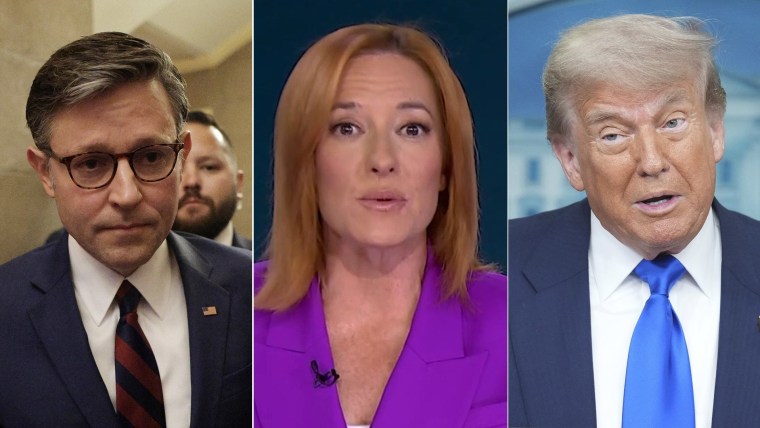House Republican leaders planned to get some work done this week before starting a five-week summer break, and as recently as Monday, House Speaker Mike Johnson told members that he had no intention of sending lawmakers home early.
The Louisiana Republican soon after changed his mind — for exceedingly awkward reasons. The chamber’s five-week break became a six-week break because Johnson wanted to avoid a vote over the release of the government’s files on the late financier and convicted sex offender Jeffrey Epstein. NBC News reported:
[The House Rules Committee] typically passes a rule for legislation on Monday that sets up debate and allows bills to come to the floor for the week. But Democrats had promised Monday to force the committee to take more votes on whether to require the Trump administration to release all remaining files from the Epstein case. To avoid embarrassing votes on Epstein, Republicans decided to recess the committee and not attempt to pass a rule for bills this week. Without a rule, Republicans would be left with nothing to vote on after Wednesday.
It was just last week when Johnson appeared on a prominent far-right podcast and said, in reference to the Justice Department’s Epstein investigation, “We should put everything out there and let the people decide. I agree with the sentiment that we need to — we need to put it out there.”
But like his commitment not to send members home early, the House speaker reversed course without explanation.
In theory, it would’ve been easy for Republican leaders to simply allow votes on the Democratic amendments related to Epstein disclosures and transparency. Why didn’t they? Because in practice, GOP leaders know that those amendments would’ve passed with strong bipartisan backing.
Or put another way, the House speaker — by his own admission — cut short the chamber’s work, and even scrapped plans to advance bills he likes, all to avoid the House exercising its will on releasing Epstein files. Johnson would rather do nothing than allow members to vote on a measure that many of his own allies support.
It’s worth appreciating the underlying motivations. The New York Times summarized:
Mr. Johnson’s decision to shut down the House early was the latest example of how the speaker has in many ways ceded the chamber’s independence in order to please or avoid angering Mr. Trump. He has deferred to the president on matters large and small, including when it comes to Congress’s spending power. He quietly maneuvered this year to yield the House’s ability to weigh in on Mr. Trump’s tariffs, in order to spare Republicans from having to cast politically tricky votes on whether to end them. In the case of the Epstein files, House Republicans are once again surrendering their institutional autonomy to appease a vengeful president.
I’ve seen some suggestions in recent days that Johnson’s actions might be motivated by foreknowledge: Perhaps, the argument goes, the House speaker knows that there’s damaging information about the president in the Epstein files, which is why he seems so desperate to avoid disclosures.
I’m skeptical of this, in part because it’s unlikely that Johnson is fully aware of the files’ contents, and in part because of his declaration last week in support of transparency.
The simplest explanation is also the easiest to believe: The House speaker has effectively accepted the role of a sycophantic White House employee. Trump doesn’t want to see a bipartisan vote in support of disclosures, so Johnson has gone to humiliating lengths to deny a bipartisan vote in support of disclosures.
The core question at the heart of this week’s developments on Capitol Hill is obvious: What is Johnson so afraid of? The answer is equally clear: He’s afraid of making his boss in the Oval Office unhappy.
At a White House event earlier this month, the House speaker handed Trump the gavel he used after the chamber approved the party’s far-right domestic policy megabill. The symbolic significance of the gesture continues to resonate.

